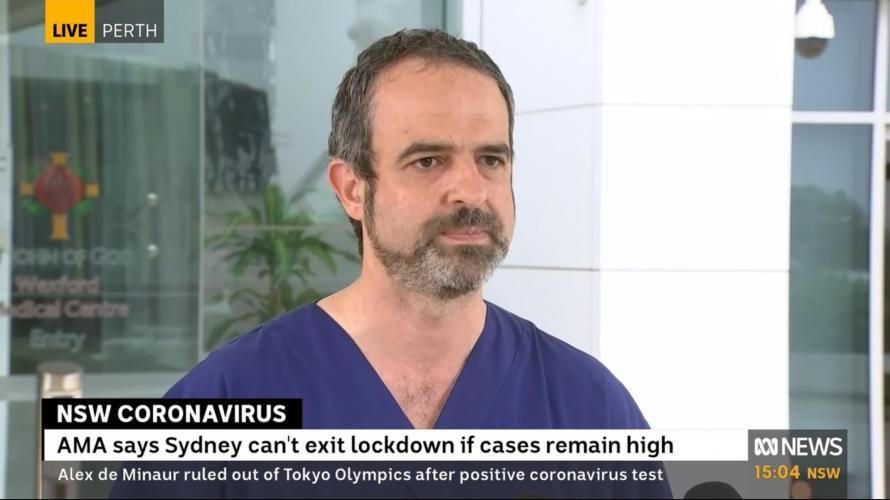Dr Omar Khorshid - Tighter restrictions for Greater Sydney, non-essential work and comment on public hospitals
Transcript: AMA President, Dr Omar Khorshid, Media doorstop Friday, 16 July 2021
Subject: Tighter restrictions for Greater Sydney, non-essential work and comment on public hospitals.

OMAR KHORSHID: The AMA today is calling on the New South Wales Government to do what needs to be done in order to get on top of this crisis in Sydney. We've now had a whole week for the current lockdown restrictions to have done their job, and unfortunately, we're still seeing a hundred cases a day, with around 30 people out and about in the community, which means that the settings are not working enough. Right now, if we keep going the way we are, New South Wales is looking at a locked down Sydney for weeks, if not months. And yet we know that the critical thing to do is to eradicate the virus from the community. What the AMA is calling for, is a lockdown more Victorian style, with very clear restrictions on what people can do to limit contact between people, between families, and in particular to limit contact at work.
So what do we mean by this? We mean closing retail that is non-essential. That should not be up to common sense, not up to people doing the right thing, but an edict from government to close non-essential retail. It means closing non-essential businesses, as was done during the lockdown in Victoria. For those businesses that are essential, they must have a COVIDSafe plan, which may involve completely changing the way they do things to in order to minimise the chance of transmission at work. These measures are needed. They are not going to have a negative economic impact on Sydney, because if they're not done, the economic impact on Sydney will be extraordinary. So it is time to take this seriously. It is time to not be hesitant, to not be worried about how this might be perceived by the community, to not be worried about the economic impact, but to take decisive action to address this crisis in Sydney and to give Sydney the best chance of getting out of this within weeks rather than months, or waiting, in fact, to the end of the year.
QUESTION: If they are continuing the way they are and don't take any further measures, do you see them locked down to, say, Christmas?
OMAR KHORSHID: The way things are going, the number of cases is not decreasing. That means Sydney is looking at the lockdown continuing indefinitely. If we don't see a drop in numbers, the lockdown cannot simply be withdrawn, and Sydneysiders are looking at extreme restrictions for the foreseeable future. That is until everybody is vaccinated. And of course, we don't have enough vaccines to vaccinate the whole of Sydney community. So our only option is to get on top of this virus right now.
QUESTION: Has this outbreak shown that vaccines are effective?
OMAR KHORSHID: Vaccines, certainly, are doing their job. We know they're doing their job, and we're seeing a number of young people in hospital in ICU, rather than the huge numbers of older people we saw in Victoria. That is a sign that the vaccines are working. Vaccines are our way out of this in the longer term. But for right now, for today in Sydney, the only way to stop this virus spreading is to stop people talking to each other, people coming close to each other, people breathing on each other, coughing on each other. We know this from the lessons that we've learned throughout the lockdown, throughout the pandemic. And our only option is to do what needs to be done right now here in Sydney.
QUESTION: The New South Wales Premier has said it was too difficult to put in place hard and fast rules about what business to open and what to shut. What do you make of that?
OMAR KHORSHID: We know from the experience in Victoria and Western Australia that governments can define what are essential businesses and they can put out that list. And yes, there will be some grey areas, yes there will be unintended consequences, yes there will be impact on people and their livelihoods. But we at least now have a situation where the Federal Government has come to the party with money. The State Government has come to the party. So businesses and workers are somewhat protected. And the best way to keep them protected and get them back to work is to eradicate the virus in the community.
QUESTION: There have been reports that stores, upmarket stores that aren't quite essential, are remaining open. Is that I suppose particularly egregious because of the financial positions of some of those brands?
OMAR KHORSHID: It is absolutely ridiculous that we still have upmarket stores being open. In fact, any stores where they're not selling essential goods. The message has to be crystal clear to the New South Wales community, and in particular to the Sydney community, and of course Western Sydney, that you've got to stay home. Simple as that; stay home. That doesn't mean go to the shops, even if you're not browsing, even if you want to go and just get that $10,000 handbag. It's not urgent. You can do it online. It's not something that has to be done now. Those shops must be closed immediately.
QUESTION: Workers are saying they feel pressured to go to work in some of those workplaces. What would you say to that?
OMAR KHORSHID: Well, we need to be talking to the business owners, to those franchise owners and the big businesses that are running these retail shops and saying: do the right thing. In fact, not even that. We need to be saying you must shut. Simple as that. It's not up to workers, it's not up to individual businesses. It's the government saying this is critical for the health of the Sydney community and you need to shut now, unless you are providing essential services.
QUESTION: Does it show that there needs to be some kind of Federal definition of what's essential work and what's not, or should it be left to the states?
OMAR KHORSHID: I think the states are actually perfectly capable of doing this. We've seen it done in other states. And New South Wales has taken this different approach of trying to trust the people of Sydney to do the right thing, and I understand that. But here we are a week down the track from this current lockdown, and it's not working. So something needs to be done differently. We can't just keep doing the same thing and expect a different outcome.
QUESTION: WA has closed the border to Victoria. Given the situation here, is that an adequate measure?
OMAR KHORSHID: WA has to do what has to be done to protect Western Australia. We've seen with the catastrophe now unfolding in Victoria what happens if COVID is allowed to cross the border. Just one breach has resulted in Melbourne now going into lockdown. In fact, all of Victoria going into lockdown. So yes, Western Australia needs to be shut to Victoria for the moment until we see whether we're going to have a similar problem in Victoria.
QUESTION: Do you support the Victorian decision to lockdown the entire state initially?
OMAR KHORSHID: The worrying thing about Victoria, of course, is that those removalists move through a number of different places in rural New South Wales, through Victoria, and into South Australia. So it's the right thing to do to shut down all of Victoria very briefly. Hopefully, we won't see any new chains of transmission outside of Melbourne. But of course, the critical thing is to get on top of the many exposure sites that there are and have done already in Melbourne, including sites as large as the MCG. It's a huge task and we've got to give the contact tracers time to get ahead of the virus. We've seen in Sydney just how hard it is to get ahead of Delta, and we have to give them every possible chance. So the lockdown is the right call in Victoria.
QUESTION: Is it irresponsible for things like the AFL to be continuing after playing at an exposure site like the MCG?
OMAR KHORSHID: It's really important that every single member of our society does the right thing to protect us all against COVID. That applies to sporting teams, it applies to politicians, to business people. It applies to all of us equally.
QUESTION: In WA, the Government is ramping it's banned drinkers register up north in Kimberley. Do you support the requirements for photo ID to be presented to purchase alcohol like that?
OMAR KHORSHID: The AMA is supportive of limiting the harms caused by alcohol in our community, not just to the person consuming the alcohol, but of course, to their friends, family and other community members through domestic violence, through drink driving and so on. So, yes, unfortunately, that means limiting the freedoms of some people where they've been deemed to have a significant problem with alcohol. And these are the kind of tough measures that just have to be taken when we live as a community, when we're trying to protect each other.
QUESTION: If there was to be an AFL club here in WA, would you expect the teams to do 14 days isolation before they play?
OMAR KHORSHID: Any teams coming to Perth from New South Wales, Queensland or Victoria, where we have significant COVID outbreaks going on, need to be put through any necessary measures to ensure there is zero chance of them bringing COVID into Western Australia. So, for most circumstances that would involve a 14-day quarantine. But I certainly trust our Chief Health Officer will not be cutting any corners in making any settings for these AFL teams.
QUESTION: Are our intensive care units and hospitals over here ready? We've seen in Sydney how quickly they had to ramp up to deal with COVID. Are we ready too?
OMAR KHORSHID: West Australian hospitals, like the hospital systems around the country are ready to deal with the COVID crisis. They have their plans. They know how to empty out. And, of course, when we go into lockdown, we see a reduced requirement for hospital services. We see a reduction in elective surgery. We see the hospitals emptying out a bit. That gives us the ability to respond to a COVID emergency. However, our hospitals are actually full all the time. And what we can't do at the moment is be confident that our hospitals are ready to look after the health of Australians into next year when we might be living with COVID, when we might be getting the flu back into our community. Our hospitals being full all the time with ambulances ramped outside just don't have any extra capacity. And it's critical that both our levels of government, that our Federal Government and our state government do what needs to be done to expand the capacity of our public hospitals and to reduce the demand so that if you get sick here in Perth or anywhere around the country, that when you turn up the hospital, you know, you're going to get the best possible care.
QUESTION: We've seen a number of young people coming down with COVID, and the Delta strain and being in ICU. What's your message to young people who might still feel they're invincible to effect of the virus?
OMAR KHORSHID: We're seeing in Sydney the consequences of this devastating virus on young people, and it's clear now that Delta has shown us that this virus can affect any and all of us. It can affect children and it severely affects those elderly people in the community. The message for all Australians is exactly the same. The only way to protect ourselves from the virus is to be vaccinated. And I know for young people, that means waiting a little longer for their vaccine. But it is coming. And as soon as you've got the chance to get vaccinated, my very strong call to all Australians is to go and do that. It is the best thing you can do for your health, not to mention to protect those in the community around you.
QUESTION: Are young people in Sydney in a position where they should possibly be thinking about AstraZeneca?
OMAR KHORSHID: Depending on how the pandemic flows in Sydney and just how many cases we see, we could be in a position where the government actually starts to recommend AstraZeneca immediately for young people in order to save their lives. Right now, we're probably not there yet. And the modelling done by our experts is still supportive of the Pfizer vaccine being the preferred vaccine for young people in Sydney. But of course, if the situation changes, that advice will change. Because at the end of the day, the critical thing is that we protect the community as best we can.
QUESTION: We've seen a case in an airport worker in Queensland. Does more need to be done to protect airport workers from the risk of COVID?
OMAR KHORSHID: Unfortunately, we are seeing a lot of transmission of the virus. We're seeing it escape these very tight measures we have, because there's been a reluctance to really wrap our arms around the whole group of people that are exposed to COVID. Whether it be at the airport or in hotel quarantine. Unfortunately, drivers, cleaners, and we're seeing it at the aged care sector as well, where governments don't seem to think that just because you're a contracted private cleaner that you need to be vaccinated. That is not true. We absolutely must include every worker who is exposed potentially to the virus in the necessary public health measures to protect the community. So that means vaccination for every person exposed to hotel quarantine, to the transport industry. It means in our aged care sector, every worker, every cleaner, every cook, every contractor that comes into the building, including doctors and nurses that might be visiting. All those people need to be vaccinated in order to protect our aged care homes. Because even if you've been vaccinated, if you're 90 years of age in a residential aged care facility, you can still get sick with COVID despite being vaccinated. And we've got to protect those people properly by taking the measures that we put in place absolutely seriously.
QUESTION: So, when it comes to Sydney lockdown, so far are you just calling for the essential places to stay open, the essential retail to stay open? Are you recommending curfew?
OMAR KHORSHID: We're not recommending curfew, because curfew was never actually recommended by public health experts from what they understand. We're certainly closing non-essential retail, actually closing non-essential businesses. That includes manufacturing, construction. Areas where it's hard for workers to do the right thing, to wear masks and social distance. If you can't put in place a COVID-safe plan, you shouldn't be operating basically until the crisis is over. And for those businesses that are essential, they've got to put in place their COVID safe plans.
QUESTION: Yeah. Well that would be a shock for people here, I think.
OMAR KHORSHID: You've got to do something different. We've had a week now to see if the current settings work, they haven't. So it's their last chance, I guess, to get on top of the virus. Because if this doesn't work, then Sydney could be living with COVID. And that means living with very severe restrictions for months to come.
QUESTION: Yeah, and I imagine they won't be allowed into WA for a very, very long time.
OMAR KHORSHID: Yeah, that's right. There'll be a moat and a large wall between Western Australia and most of the country. And I think it's really sad that that's where we are. But it shows how dangerous Delta is. This is the first time we've tried to fight Delta, and it'll be very interesting to see whether Victoria succeeds with its lockdown and getting ahead of Delta so far. We haven't really had a proper outbreak apart from Sydney. So it'll be interesting to see if Victoria wins.
QUESTION: Yeah. And is it Indonesia that's currently battling with Delta?
OMAR KHORSHID: Yeah. Indonesia's a horrible situation, because although they've had COVID before, they've now got Delta. They've been using a Chinese vaccine which is not as effective. So that had a number of doctors and other healthcare workers dying of COVID due to Delta, despite being vaccinated. Because the vaccine is just not as effective as Pfizer and AZ are. And, of course, a large portion of the population is not vaccinated, and they're very high density [Indistinct]…
(Ends)



